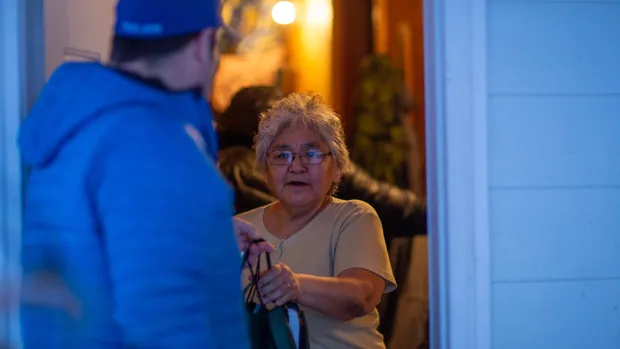A new project based in Inuvik, N.W.T., is tackling food insecurity while offering employment opportunities and reconnection to traditional harvests in the N.W.T.’s Beaufort-Delta region.
Have you ever wanted to try whale sausage, muskox steak, fish jerky or beaver bacon? If you are Inuvialuit, you are in luck.
Ashley Jacobson, 30, has been preparing and packaging those things at a new country food processing plant in Inuvik, N.W.T. She loves the job, as she grew up in Tuktoyaktuk harvesting wild meats and learning from her elders about respect for the land and animals.
“I heard a lot of good feedback,” Jacobson said about the food that’s been distributed to Inuvialuit homes across the region. “It means a lot, especially for the isolated communities where everything is so costly, like the groceries, the price they pay to harvest animals.”
The wild game food processing project was organized by the Inuvialuit Regional Corporation (IRC) as a way to tackle food insecurity problems, offer employment opportunities, and reconnect Inuvialuit to traditional harvests in the Beaufort-Delta region.
The wild meat is supplied from hunters and trappers across the six Inuvialuit settlement communities — Inuvik, Aklavik, Sachs Harbour, Paulatuk, Ulukhaktok, and Tuktoyaktuk.
Since August, Jacobson and four others have been working at the two-trailer plant in Inuvik. She says she’s been busy training new hires, and preparing meat for distribution.
“We cut up the beaver and grind it and spice it up and then we throw it in the smoker,” she explained. “Then the next day we cut them into slices.”
“It tastes better than bacon, they’ve been saying.”

She said her daily challenge is waiting for meat to thaw before preparing it. Moose and caribou are her favourite animals to harvest.
‘It’s been amazing’
“She’s exactly the type of Inuvialuk [we] want to create opportunities for,” said Brian Wade, director of the country food processing project, referring to Jacobson.
“Hard-working, now fully trained in this, contributing to food security in the region and learning valuable and transferable skills. We take this work so seriously, it’s been amazing to see it come to life.”
Under the program, harvesters in Inuvialuit Settlement Region (ISR) communities are compensated for any wild meat they provide. That meat then goes to the processing plant in Inuvik before being redistributed throughout the region.

Wade has also been working with Jacobson and the other workers to also make use of the hides and furs, minimizing any waste.
“It’s nice to be able to share different meats from our own specific little regions to the whole ISR,” Wade said.
Wade says the first shipment went out just before Christmas to registered Inuvialuit households across the six settlement communities.
The goal is to distribute meat four times annually, with the next shipments going out in March or April.
Wade said the program represents a “significant” amount of the IRC’s budget. Twelve Inuvialuit beneficiaries were hired and trained last summer to operate the processing plant, and since August there have been five full time staff at the plant.
The program has been a long time coming. Country food processing courses have been offered since 2015 through a partnership with Aurora College, the Gwich’in Tribal Council and the N.W.T. government.
Last year, the IRC also took over management of a reindeer herd, with the goal of growing the herd as a sustainable food source.
Good response from harvesters
Michelle Gruben,who is with Aklavik’s Hunters and Trappers Committee and an IRC community board member, is excited about the program.
She said she’s especially happy for the beneficiary families to be able to access and try meats they would not normally have access to.

She said local hunters and trappers committees put out calls for different types and quantities of harvest meat, mainly through their Facebook pages.
The response from harvesters has been good, she says.
“Living this far north, gas is expensive. Shells are expensive. The use of your equipment is expensive,” Gruben said.
“They grew up living on the land, getting food from the land, and for them to harvest their own food from the land and share it with the processing plant, I think that’s a bonus for them.”
She said the compensation for harvesters is fair. As an example, she says 10 burbot, or loche, fish, would mean $200 in compensation.
“The last time I put a call out for burbot, within five minutes, we had 25 names.”
Gruben said a recent call-out saw the program received around 300 burbot and two muskox. A call for moose and muskox in Aklavik was paused because of COVID-19 restrictions, but Gruben said that will go out again within the next week.

